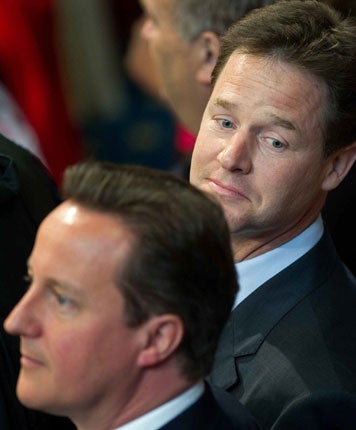Andrew Grice: Why one side of the coalition benefits more than the other
Inside Politics

David Laws is one of us," one senior Conservative MP boomed. "He's got balls of steel," beamed another. They were talking about a remarkable performance in the Commons on Wednesday, when the Liberal Democrat Chief Treasury Secretary swatted away Labour's protests about the coalition Government's £6.2bn spending cuts.
Mr Laws was sent naked into the chamber without the protection of his boss, the Chancellor George Osborne, or other Cabinet figures, perhaps symbolising his role in providing useful cover for the unpalatable cuts that will follow this week's easy meat. He didn't seem to mind as he defended the cuts. "He was brilliant," a Labour frontbencher admitted.
Tory MPs joked about the return to the Treasury of "stern, unbending Gladstonian Liberalism". Mr Laws, never tempted by previous Tory attempts to persuade him to defect, reminded his new friends that he also hoped to deliver "the social liberalism about which my party is so passionate".
Indeed it is. While Liberal Democrat ministers get stuck into their new Government jobs, some party figures are starting to wonder about the downside of power. "Are we just a convenient shield for the Tories?" they ask. Not only on the cuts. There is also the self-interested Conservative plan to equalise the number of people in each parliamentary constituency, which Labour reckons will cost it 30 seats. This will get little attention because it has beencoupled with the Liberal Democrats' key demand for a referendum on the voting system. Nick Clegg wants that to take place within 18 months but Mr Cameron has not yet agreed a timetable, perhaps because he wants the boundary review to be sneaked through under the cover of the referendum.
Although the coalition is still in its honeymoon phase, Liberal Democrats also wonder about how this marriage of convenience will end. They can see a clear exit strategy for Mr Cameron at the next election: "We have shown we can govern responsibly, we are no longer the nasty party, we want a new mandate." But they can't see a smooth way out for Mr Clegg.
The gloomsters are a bit premature: "We're still working out the entry strategy," quipped one Cameron aide – but they have a point. Jitters about the coalition among Tories have been more public but they exist in the Liberal Democrats too.
The special conference of party members two weeks ago in Birmingham produced headlines about the Liberal Democrats endorsing the coalition deal with the Tories. But it also passed a long, unpublicised motion declaring that the Liberal Democrats "remain an independent party and that nothing in this [coalition] agreement prevents the party from developing a new policy through its democratic processes".
In a warning shot across Mr Clegg's bows, the conference urged Liberal Democrat ministers to work to ensure the income and wealth inequality gap was reduced significantly; reaffirmed the party's policy to scrap university tuition fees (which the Tories are expected to raise); opposed any moves to repeal the 1998 Human Rights Act (a Tory manifesto pledge), demanded proportional representation for local authority elections in England and Wales and reaffirmed its support for PR in general elections (it won't get that because the Tories have agreed only a referendum on the alternative vote, which is not proportional).
Clearly, Mr Clegg needs to administer a dose of TLC to his party grass roots, to reassure them that he will keep the flame of liberalism burning – social as well as economic. Vince Cable's decision to stand down as deputy party leader is partly aimed at keeping the activists onside. As a Cabinet minister, he couldn't criticise his own Government. But a deputy leader like Simon Hughes or Tim Farron who is not a minister can – and will. The Liberal Democrats also need spokesmen for the departments where they do not have ministers (environment, international development, culture) and to make new policy on all issues so that they have something to say at the next election other than "we defend the last government".
Some Tory right-wing diehards, who feel Mr Cameron is using Mr Clegg to marginalise them, suspect the two parties will fight the next election as one – either after a merger or in some form of electoral pact. That seems highly unlikely. The Tories will surely want to win power in their own right and there are long memories in the third party of the SDP-Liberal Alliance, which had two leaders – and ended up with David Steel in David Owen's breast pocket on Spitting Image.
We are all still getting used to coalition politics. The impact at the next election may be less dramatic than many politicians and commentators expect. Thursday's delayed election in Thirsk and Malton showed that the Liberal Democrats can still win votes in Tory territory. Their share of the vote was up 4.5 points on 2005, the Conservatives' up one point and Labour's down 10 points. The result was similar to others in North Yorkshire on 6 May. In the Scottish Parliament, the Liberal Democrats were in coalition with Labour for eight years and still fought it hard at elections.
The big challenge for Mr Clegg will be to show the doubters in his party, and then among the voters, that the Liberal Democrats have made a real difference to this Government – and delivered gains as well as the pain of the cuts.

Join our commenting forum
Join thought-provoking conversations, follow other Independent readers and see their replies